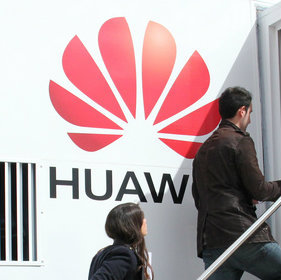Sales and profits rose for the Chinese equipment giant, but it has undoubtedly been harmed by US measures.

Huawei said it expects 2020 to be the worst year in its history as it deals with the impact of the COVID-19 pandemic and US trade sanctions it has already blamed for a $10 billion sales shortfall at its consumer business last year.
The company's warning came as it published results that showed growth in both sales and profits last year but included signs the US campaign against Huawei is having an impact.
While total sales were up 19%, to about 858.8 billion Chinese yuan ($121 billion), Huawei's net profit rose just 5.6%, to RMB62.7 billion ($8.8 billion), after growing by a quarter in 2018.
Eric Xu, one of the company's rotating CEOs, blamed the slowdown on additional investments Huawei made after its name was added to the US Entity List, a blacklist of organizations that are prohibited from buying components made in the US.
"We certainly had to invest more in R&D to fix the holes," he told reporters during a press conference this morning. "All of a sudden a large number of suppliers could not continue supplying and we had to rebuild the supply chain. Survival turned out to be the first priority."
The unusually frank assessment is at odds with some of the recent updates provided by Ren Zhengfei, Huawei's founder, who has downplayed the impact of the US campaign in discussions with journalists.
Figures published today show that Huawei spent a massive RMB131.7 billion ($18.6 billion) on research and development, up from RMB101.5 billion ($14.3 billion) in 2018. As many as 96,000 employees are now engaged in R&D, compared with "more than 80,000" in 2018, and the entire workforce has grown from about 188,000 employees to nearly 196,000 over this period.
Even if Huawei has a broader range of business activities than its chief Western rivals, the sums are extraordinary. Finland's Nokia pumped about $4.5 billion into R&D last year, while the mobile-focused Ericsson made investments of about $4 billion.
On the sales side, the main impact of the US campaign was felt by the consumer business division, which makes handsets, tablets and other gadgets and was blocked from using Google Mobile Services – the Internet giant's suite of Android-based applications and software – as a result of the US blacklisting.
"The consumer business outside China was growing fast before May 16 and was declining fast after May 16 and only started to bounce back in the fourth quarter," said Xu, estimating that about $10 billion in consumer sales were lost in markets outside China.
Despite this, consumer revenues grew 34%, to RMB467.3 billion ($65.8 billion), accounting for more than 54% of Huawei's total sales.
With relatively few countries bowing to US calls for tough restrictions on Huawei in the 5G market, the company's carrier business recorded growth of 3.4% in revenues, to around RMB296.7 billion ($41.9 billion), after suffering a sales decline of 1.8% in 2018.
Want to know more about 5G? Check out our dedicated 5G content channel here on Light Reading.
Former customers including Optus and Vodafone in Australia, TDC in Denmark and Telia in Norway all decided to hire alternative suppliers to build their 5G networks, but the effect on sales was relatively small because 5G accounted for just $3 billion in revenues last year, Xu told reporters.
"Percentage-wise it's very small," he said. "2019 was the year when global 5G deployment was kicked off. We haven't seen large-scale rollout yet."
His expectation now is that 2020 will be a much tougher year than 2019 for Huawei as it faces a full year on the Entity List and an array of other business and regulatory challenges. "It is going to be the most difficult year for Huawei," he said.
Of huge concern to the company's suppliers and customers is whether the US is preparing even tougher export restrictions, as recently reported by Reuters and China Daily. Such moves could force Huawei to seek alternatives to Taiwan's TSMC and other semiconductor firms that rely on US production equipment, after some US suppliers to Huawei began exploiting loopholes in the Entity List ruling. They could also provoke a response by the Chinese government, Xu warned.
"The Chinese government will not stand by and watch Huawei get slaughtered on the chopping board and they may also take some counter measures," he said, suggesting that authorities might seek to ban the use in China of 5G chips and smart devices provided by US firms. "This type of destructive ripple effect on the global industry would be astonishing."
There was also a troubling assessment of the impact COVID-19 will have on 5G deployment this year, with Xu warning of a slowdown in European rollout. "5G deployment in Europe will certainly be delayed to when the pandemic is brought under control," he said.
In China, by contrast, he expects operators to exceed their 5G targets this year. "After the pandemic was brought under control, China has accelerated its 5G deployments," said Xu.
Related posts:
— Iain Morris, International Editor, Light Reading
About the Author(s)
You May Also Like











